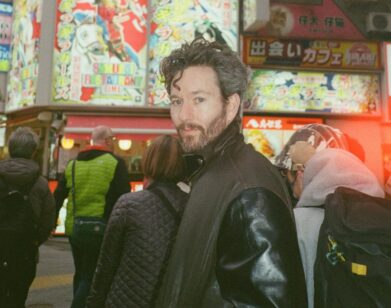Fame Monster: Martin Amis on Lionel Asbo

In Martin Amis’ wicked new novel Lionel Asbo: State of England (Knopf), the brilliant Brit has created a sexy and savage portrait of crime and celebrity in the UK. Lionel Asbo has been a terror since he was born into the desperate neighborhood of Diston; with the square, solid build of a deranged soccer player, Lionel terrorizes, tortures, and tenderly loves his young nephew, Desmond. Desmond, having lost his mother, wades through his grief as Lionel’s ward. Des also has his own painful and hilarious problems: an illicit affair with his grandmother and a driving passion to learn despite his derelict surroundings. When Lionel wins unfathomable millions in the lottery, his criminal career takes a startling turn, and his new obsession becomes his growing tabloid celebrity. Desmond grows, too, in more human and vulnerable ways; and their relationship, glued together by a gooey and gory shared history, changes profoundly. Amis captures the lonely, laughable, lewd, greedy, gaudy part of humanity with sincerity and captivating satire.
We armed ourselves with a tall tumbler of Scotch to speak with Amis from his new home in Brooklyn about working hard at being stupid, luxury, fame as religion, public image, prison, and if money changes everything.
ROYAL YOUNG: How about working hard at being stupid?
MARTIN AMIS: With all the people I’ve known who are not a million miles away from Lionel, I’m always impressed by how intelligent they are, despite pretending not to be. I think there’s a huge reservoir of thwarted intelligence down there in that near-criminal class. What happens if you are intelligent and no one brings you on, or helps you, then you do say, “Ah, the hell with it!” You turn away from intelligence.
YOUNG: I think there can be real power in playing dumb. But how do we bring thwarted intelligence to fruition?
AMIS: It’s an enormous project. The slogan of New Labor in England around the turn of the century was “Education, education, education.” I do think that’s where investment should take place.
YOUNG: What about people who are self-taught?
AMIS: That’s asking a lot.
YOUNG: But, Des, for instance, has a passion for knowledge and seeks it out more passionately because he doesn’t have the normal tools to learn.
AMIS: I think it’s a noble thing. It can be very isolating. Your education doesn’t stop when you finish it. When it formally ends. It goes on all your life. Having the impetus to do it in the first place is exceptional.
YOUNG: How do you think luxury affects people?
AMIS: For a starving man, luxury is a slice of bread.
YOUNG: What about the luxury Lionel comes into so suddenly?
AMIS: It makes him feel very uneasy. He’s got nothing he cares about. Even money, the driving force of his life since infancy is suddenly meaningless to him. He’s bored by luxury.
YOUNG: It seems to me that is something large levels of luxury does to a lot of people. Nothing matters anymore.
AMIS: Yeah, everything seems pointless. All striving seems pointless.
YOUNG: Because all your goals are taken away.
AMIS: Right. Like, all retired soccer players, they wake up in the morning and just don’t know how to fill the day. They’ve got lots of money and luxury, but they have no reason to get out of bed.
YOUNG: Kind of like ladies who lunch. That’s all they really do. That seems like such a horrible reason to wake up every morning.
AMIS: Doesn’t it? Yeah.
YOUNG: What about fame, how does that affect people? There’s a modern mania for it.
AMIS: It’s replaced religion. Modern people feel it’s a right.
YOUNG: [laughs] What do you think that’s doing to us?
AMIS: I have no idea, yet. But it seems to be a weird way to go on. Fame in writing, you need a certain amount of fame, because you’re competing with so many other claims on the reader’s interest. If that weren’t the case, I don’t see what the advantage of fame is. It’s sort of nice to enter a room and feel you can hold your head high, but there’s no question that’s a matter of reassurance. Otherwise, it’s more trouble than it’s worth.
YOUNG: When you said you’re competing with other interests, what do you mean?
AMIS: I mean other claims like that movie, TV show, video game.
YOUNG: I feel like fame and luxury in all its fervent religion has made our attention spans so much shorter. We want everything now and everything more, more, more, always.
AMIS: Yeah. It’s already been shown that the computer-savvy brain is different from the normal brain. Like the literate brain is different from the illiterate brain. I mean physically different. I’m not talking metaphorically. You’ve got extra bits. They’re hanging off. Imagine what it’s doing for your mental habits.
YOUNG: The lengths Lionel goes to preserve his public image towards the end of your novel seem really deranged, almost more so than the crimes he’s committed in the beginning of the book.
AMIS: When I set myself the task of imaging what winning all that money would do to Lionel, a bit of shock would be the main one. For that brief period when he’s out of prison, before he goes back, he’s in a state of shock. It’s only when he’s back in prison that he calms down and gets his head together.
YOUNG: For career criminals, prison is home away from away.
AMIS: Right, they don’t mind, they have most of their creature comforts and don’t have to worry about being arrested.
YOUNG: I want to explore this idea of public image versus public life. When those lines become blurred, what happens?
AMIS: They don’t become to blurred to me. They feel perfectly distinct to me. But I’m not Lionel. I think a lot of people for whom public existence is confusing and completely overwhelming, still their private life means nothing unless it is reflected in the public.
YOUNG: Where do you think that need comes from? More and more, a moment we have privately doesn’t matter unless everyone else knows about it.
AMIS: Well, that’s sort of Twitter, isn’t it? I can’t think of a more frivolous way of spending your time than telling everyone you just had a shit that morning and you’re going out to lunch now. I don’t want to follow anyone and I don’t want anyone to follow me.
YOUNG: Does money change everything?
AMIS: For me, money means not having to think about money. I have no further interest in it.
YOUNG: How does life work when you’re living in a desperate city versus the grandeur of a rural estate?
AMIS: There’s what Lenin called “the idiocy of rural life.” I like it every now and then as a change. But, I very much live for the thrive and urgency of the city.
YOUNG: How do you feel about the Brooklyn character?
AMIS: Oh, they’re sweet and innocent. It’s very much like living in the 1950s.
LIONEL ASBO: STATE OF ENGLAND IS OUT TOMORROW.






